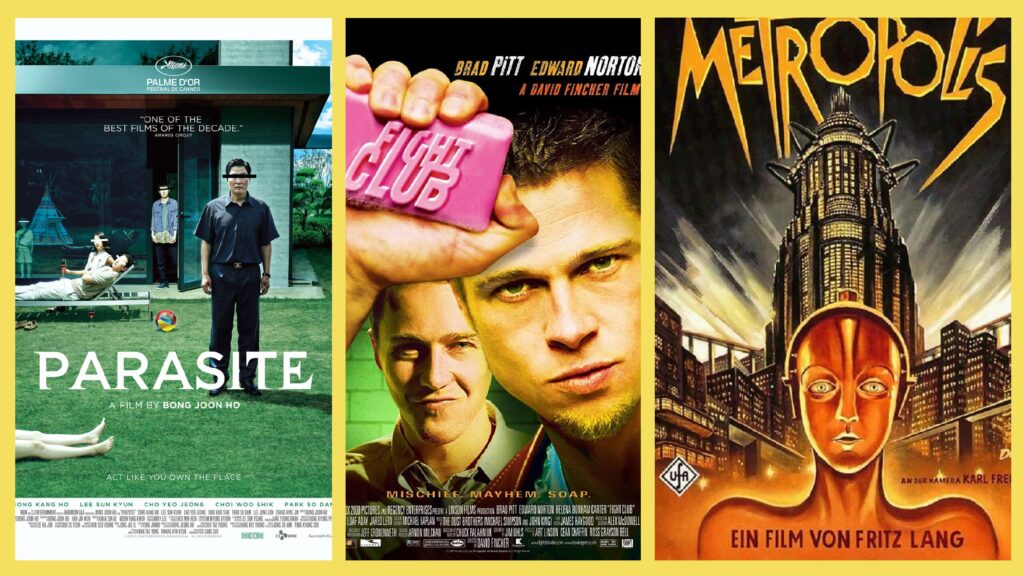Marxism has a long history in film. There are some films that are influenced by Marxism and have a wide variety of qualities. They represent many different aspects of Marx’s theories. On the other hand, through the perspective of a number of directors, it is possible to show what Marxism has meant to humanity.
Parasite****
Parasite is a 2019 South Korean black comedy thriller film directed by Bong Joon-ho. It follows a poor family who schemes to become employed by a wealthy family and infiltrate their household. Parasite won four Academy Awards at the 92nd Academy Awards, becoming the first non-English language film to win the Academy Award for Best Picture. It grossed over $258 million worldwide on a $15.5 million budget. Parasite tells the story of a lower-class family as they slowly infiltrate a bourgeois household. As the story progresses, the family struggles to hide their secret or contempt for their employers.
House of Tolerance****
House of Tolerance is also known as House of Pleasures. The film is a 2011 French drama film written and directed by Bertrand Bonello. The film had its world premiere in the Competition section of the Cannes Film Festival on 16 May 2011. It stars Hafsia Herzi, Céline Sallette, Jasmine Trinca, Adèle Haenel, Alice Barnole, Iliana Zabeth and Noémie Lvovsky. The film House of Pleasures chronicles the final days of a Parisian brothel at the turn of the century. It tells the collective story of women forced to give in to the whims of their bourgeois clients. The film does not put particular attention on any one character and instead focuses on the women of the brothel.
Fight Club****
Fight Club is a 1999 American film starring Brad Pitt, Edward Norton, and Helena Bonham Carter. The film was directed by David Fincher and starring Brad Pitt, Edward Norton, and Helena Bonham Carter. It is based on Chuck Palahniuk’s 1996 novel of the same name. Fight Club failed to achieve the studio’s box office predictions and earned mixed reviews from critics. In Fight Club, a white-collar worker decides to form a fight club with his new friend, Tyler Durden. The club quickly grows as Tyler turns the club into an anti-capitalist organization. The film is often read as a critique of modern capitalism through its narrative and visual style.
Weekend****
Weekend (French: Week-end) is a 1967 French black comedy written and directed by Jean-Luc Godard. And it was starring Mireille Darc and Jean Yanne, both of whom were mainstream French TV stars. Jean-Pierre Léaud, comic star of numerous French New Wave films including Truffaut’s Les Quatre Cent Coups (The Four Hundred Blows), appeared in two roles. Raoul Coutard served as cinematographer; Weekend was Godard’s last collaboration with Godard for over a decade. The indirect inspiration for the movie was Julio Cortázar’s short story La autopista del Sur (“The Southern Thruway”). Weekend exemplifies Marxism in film in both its narrative and visual style. Jean Luc Godard incorporated Marxist film theory in many films spanning several decades. In the film, a couple travels to Corinne’s parents’ house to secure her inheritance. They encounter many strange characters and situations along the way.
Metropolis****
Fritz Lang directed Metropolis, a 1927 German expressionist science-fiction drama film. It is one of the earliest feature-length films in the genre, written by Thea von Harbou in conjunction with Lang. Filming lasted 17 months and cost more than five million Reichsmarks in 1925–26. When Metropolis was first released, it had a mixed response. Critics praised the film’s impressive spectacular effects but criticized the plot as naive. In inSight & Sound’s 2012 critics’ survey, Metropolis was placed 35th among the most influential films of all time. The film was placed on UNESCO’s Memory of the World Register in 2001, making it the first film to do so. It was 95 percent recovered after a long restoration procedure that necessitated the use of new elements provided by a print from New Zealand, and it was projected on enormous screens in Berlin and Frankfurt on the same day on February 12, 2010.

